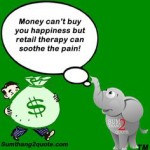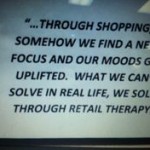Why Shopping Can Be Good for Your Health
Feeling down? A trip to the mall might help.

By Daniel Bortz+ More
- When your significant other says it’s over, your first instinct may be to seek comfort in a pint of ice cream or a stiff drink. But there are healthier ways of nursing a broken heart – including shopping.
In a recent survey by TNS Global on behalf of Ebates.com, around 52 percent of respondents said they’ve engaged in “retail therapy,” the act of shopping and spending to improve one’s mood. Both men and women admitted they’ve opened their wallets when feeling blue. However, this form of therapy can put your finances at risk if it’s the only way you can temper your mood, or if you feel guilty about your spending behaviors and don’t shop in moderation.
When you’re sad, you see the world differently, says Scott Rick, a professor of marketing at the University of Michigan whose research focuses on the emotional causes and consequences of financial decision-making. Rick says people who are upset often think they live in an environment that’s out of their control. One way to restore control, he says, is by making choices about what to buy.
Decisions can be between material items (a pair of shorts versus jeans) or what to consume (a smoothie versus a milkshake). Studies show retail therapy is less effective for feelings like aggression, but Rick says purchases – cheap or expensive – can help relieve mild depression.
Despite its benefits, retail therapy is shunned by many consumers. “I think it’s unpopular these days to say you shop for pleasure because we’re supposed to be in some stoic state in this post-recession economy,” says Kit Yarrow, a professor of psychology at Golden Gate University in San Francisco who studies consumer trends and behaviors. “I think shopping serves as a healthy purpose for a lot of people. If it works for you, you should not feel guilty. Do it, enjoy it and don’t overdo it.”
April Lane Benson, author of “I Shop, Therefore I Am: Compulsive Buying and the Search for Self,” says consumers must be conscious of their shopping behaviors. Although retail therapy can have positive effects, she says it can easily evolve into a spending problem. “We turn to instant gratification when we feel distressed,” Benson says.
Yet sometimes a quick pick-me-up is necessary. Margaret Meloy, a professor of marketing at Pennsylvania State University and co-author of the 2011 study “Retail therapy: a strategic effort to improve mood,” says people must diffuse negative emotions before they worsen, or they could lose control of their shopping behaviors and act recklessly with money. Such untreated depression or frustration can push people to spending extremes.
A key difference between healthy and compulsive shoppers is that compulsive buyers often experience remorse when they get home and see what they bought, Meloy says. Meanwhile, consumers who use retail therapy modestly don’t regret their purchases. “There isn’t this kind of upward and then downward spiral as there typically is with compulsive shoppers,” Meloy says.
People who use retail therapy appropriately are not only happier but may also be more confident, perform better at work and express themselves more creatively, according to Yarrow.
Yarrow says when consumers shop with purpose, using a checklist (written or mental) of things they need, their purchases can make them feel more equipped to handle certain situations. A prime example: couples with a baby on the way. “A lot of them just go crazy at the mall, but they’re actually imaging themselves as parents,” Yarrow says. “When people visualize their new life through the process of shopping, they feel more in control and more prepared.”
Similarly, buying a new work wardrobe can boost your confidence and potentially improve or weaken your job performance. A study last year by researchers at Northwestern University found participants who wore white doctor’s coats performed better than participants in ordinary clothing on tests of attentiveness and concentration (traits associates with experienced physicians). As such, some workers perform differently on casual Fridays; people who wear sweatpants to the office instead of a suit, for example, might be more lackadaisical with their duties than they are on the other days of the week, according to Yarrow.
Related
Discover more from ReviewFitHealth.com
Subscribe to get the latest posts sent to your email.



